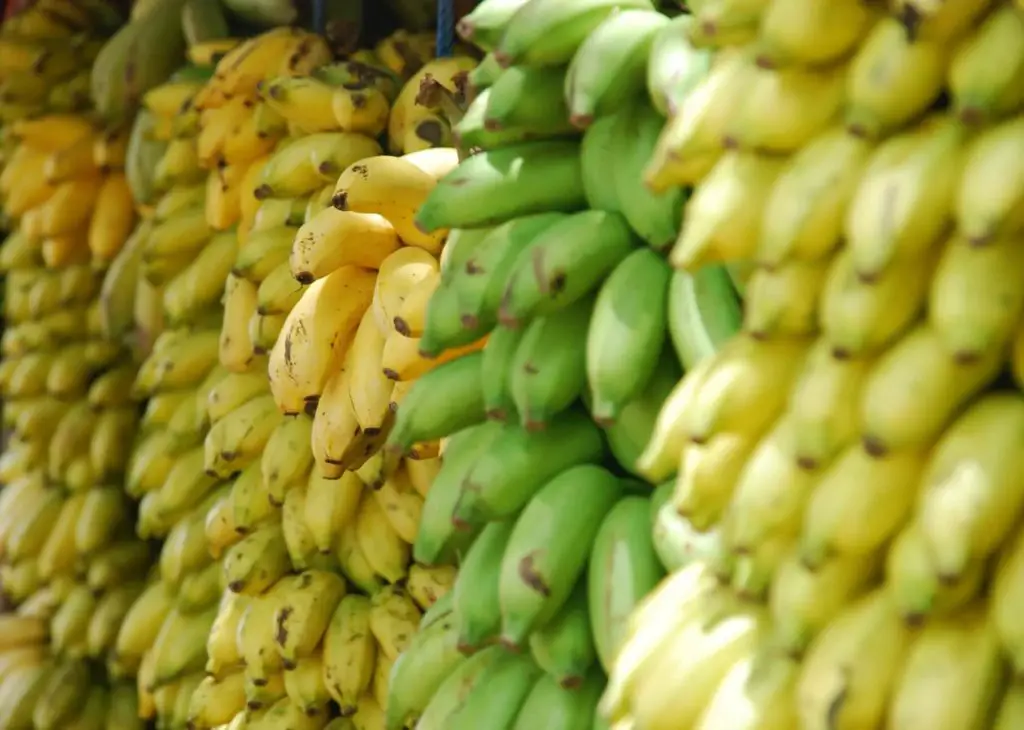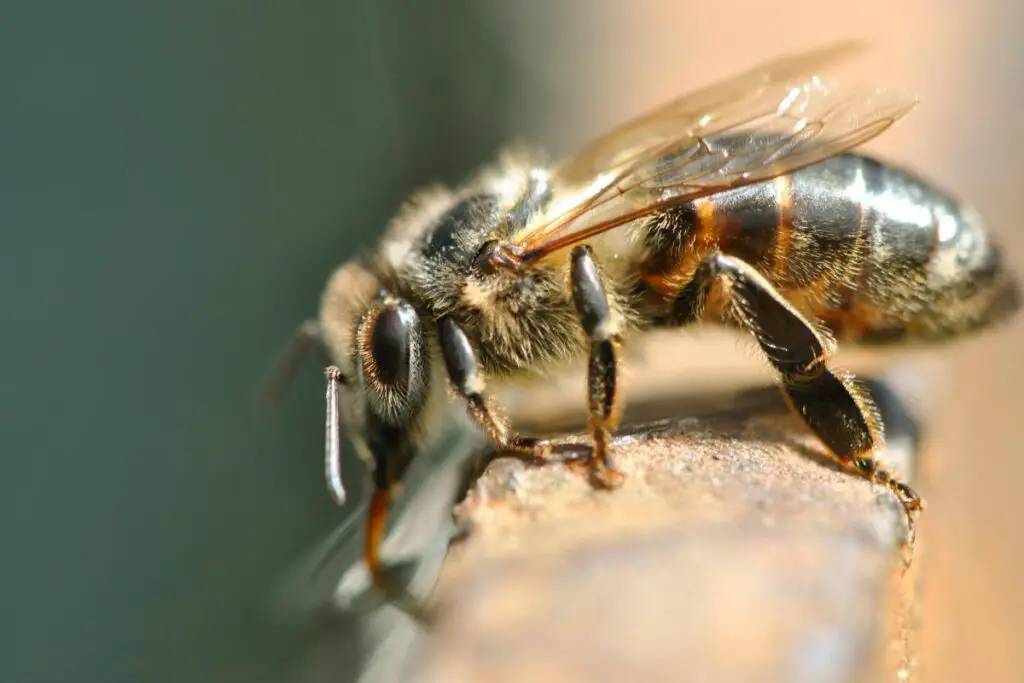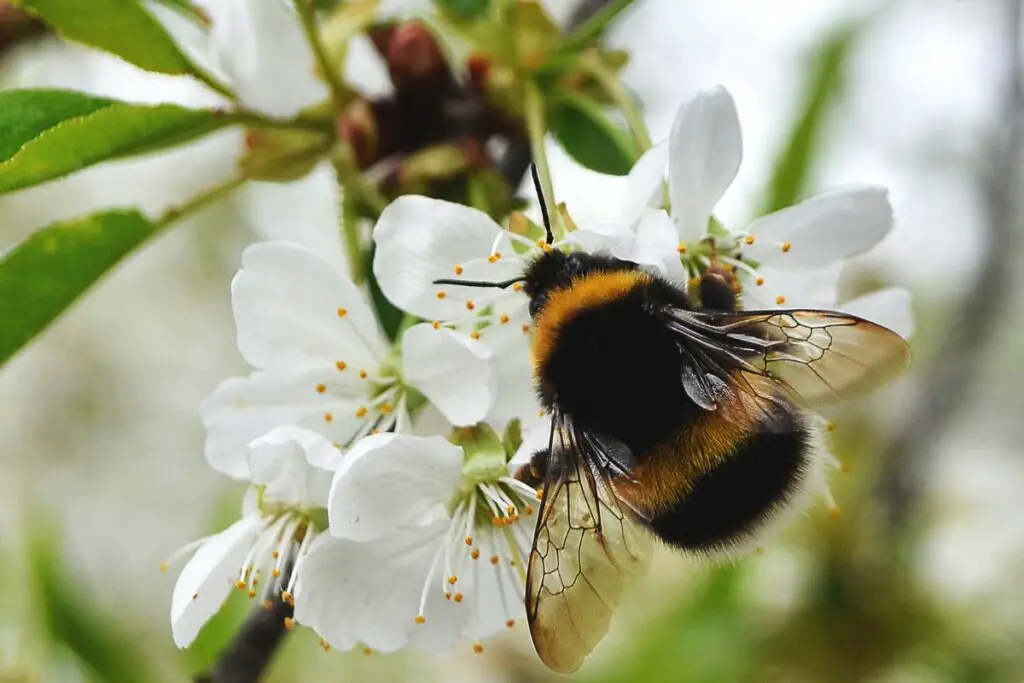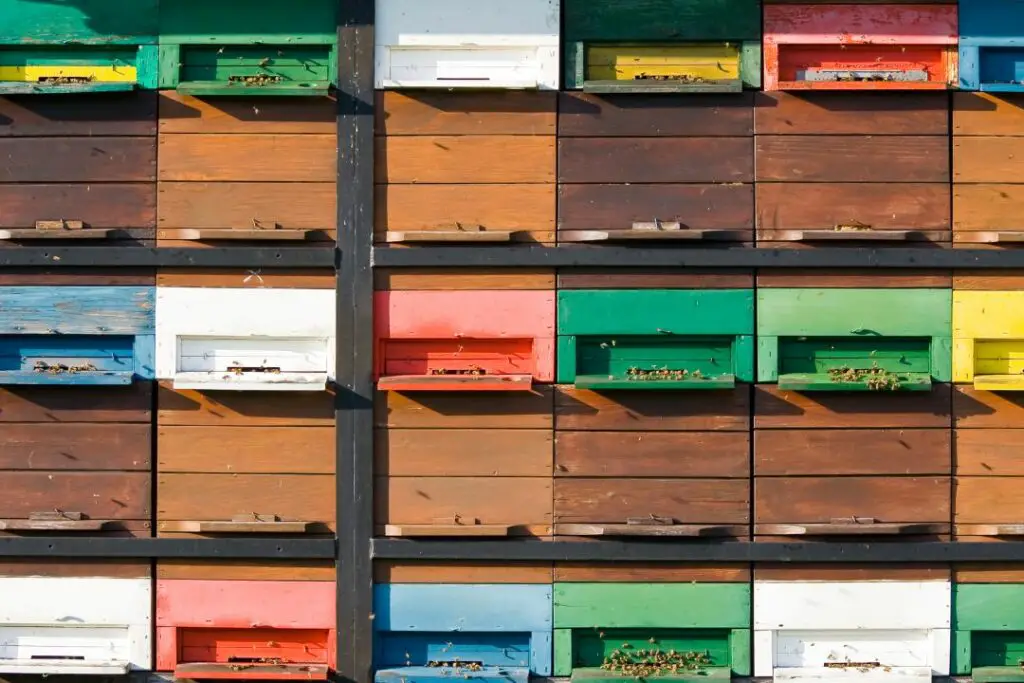Last updated on January 15th, 2024 at 03:49 pm
Yes, bananas contain natural sugars that bees are attracted to.
But more interestingly, bananas contain a compound naturally occurring in the alarm pheromones bees release when they’re under threat.
Feeding a banana to a managed hive or consuming a banana close to a wild nest could (in theory) trigger an aggressive reaction due to the similarity in the compounds.
When it comes to bees and bananas, there have been very few actual studies carried out. Master Beekeeper Katharina Davitt studied the Cavendish Banana and its nutritional benefit to honeybees.
This study was conducted in warmer climates. There has been no scientific research regarding bees and bananas performed in temperate climates, so domestic and commercial beekeepers submit most of the information available.
do bees eat bananas?
Bees will feed on various sources of sugar they find while foraging, including fruit that offers an easy route to access.
This sugary feast normally happens when ripe fruit falls to the ground and splits offering up its contents.

Do Bananas Make Bees Aggressive?
The jury is well and truly out on this one. Some people swear that bananas drive honeybees into a stinging frenzy while others view it as a ‘beekeeping myth’.
I didn’t want to introduce bananas to my hive for some of the reasons I mentioned below, but I was willing to test out this theory.
For full transparency and (arguably) scientific research, my hive is located in the south of England with a moderate climate and arguably a very passive colony that hardly ever stings. I conducted this test on 17/5/22.
Don’t miss our guide on what bees eat to find out more about our favourite insect’s diet.
Feeding Bees Bananas
For safety reasons and because I genuinely didn’t know how my bees would react, I did opt for a full beekeeping suit for safety.
If you’re new to beekeeping and wondering if bees can sting you through clothing, they can!
With a little trepidation, I peeled my banana down and approached my hive at around 20m and then slowly moved to around 5m from the hive’s entrance.
Nothing, no reaction whatsoever. A little disappointed, I continued further and eventually inspected the hive, banana in hand.
When I opened the hive, a few more active bees bounced and pinged around my veil, but nothing out of the ordinary.
I stayed for a few minutes to see if the bees would have a delayed reaction, but other than the occasional ping against my veil, they seemed fairly interested in me or the banana.
While you may not want to carry around a banana, our Bee Revival Kit is the perfect way to help bees without the risk of a nasty sting.
Can Bees Eat Bananas?
Bananas contain lots of nutritional benefits for honeybees. They’re packed with carbohydrates, vitamins and minerals that aid a bee’s natural growth and development.
In her study, Katarina suggests using bananas as a substitute during a dearth (a lack of nectar-producing flowers normally due to a poor season) or during the fall.
Some beekeepers have promoted bananas as a potential solution for parasitic spores.
The idea here is that gases released from ripe bananas work to destroy any spores found within the hive.
Other sources claim that bananas can effectively treat conditions such as Varroa destructor ( the Varroa mite), Nosemosis or Nosema disease and Chalkbrood disease.
Despite these claims, no scientific research is cited alongside them, making them theoretical at best.
Why Are Bananas Bad For Bees?
While bees can eat bananas to gain many nutritional benefits, some clear issues exist around feeding bananas to your managed hives.
Bananas are commonly infested by parasites and pathogens that can severely affect an entire colony if introduced even by a single bee.
As bananas ripen and spoil, they slowly increase in sugar content as starch is slowly transformed into sugar.
This does not escape the attention of opportunists that live around your hives.
Small insects like ants, hornets, wasps and beetles will be attracted to ripening bananas and force entry into your hives in large numbers.
Even small mammals will be attracted to bananas, putting your bees at risk. Mammals that may investigate your hive include voles, mice, possums, skunks, and, in extreme cases, even bears.
- 🐝🐝🐝 Wildlife Gifts To Help Bees & Pollinators - Your Bee Revival Keyring contains a special...
- 🎁🎁🎁 Bee Gifts For Women - Give the gift of giving with our bee accessories from Revive a...
- 🌱🌱🌱 Plantable Seed Paper Packaging/Seed Gifts - What makes the perfect eco gift? We think...
- 🌍🌎🌏 Planet Friendly Gadget Keyring - A great gift for a friend or loved one who cares about...
- 🐾🐾🐾 Supports Rewilding Britain - A percentage of every sale will be donated to Rewilding...
Nutritional Issues
Alongside the practical issues above, bees that consume bananas will also be met with many issues due to some of the substances contained within the fruit.
Honey bee dysentery
Bananas have a high ash content that does not dissipate as bananas ripen and spoil.
Ash refers to the indigestible part of food that honeybees store in their guts and defecate during foraging flights.
It needs to be expelled from the bee’s gut as large amounts of ash in a bee’s system would eventually cause it to expire.
Ash from bananas doesn’t pose a problem during the summer when worker bees regularly leave the hive for cleansing flights.
But worker bees won’t take flight unless the temperature exceeds 12°C or 55°F.
Due to the ever-increasing volatility of seasons, the times between winter flights can run for several months.
When worker bees are grounded for long periods, they have no choice but to defecate the waste ash within the hive’s interior. This is honey bee dysentery.
This poses two major risks to the colony, faecal matter contains pathogens and parasites that run the risk of infecting other bees within the colony.
*More reading – Learn more about bee waste systems in our short read do bees fart?
Dysentery caused by bananas also carries a foul smell that can mask the natural smells and pheromones produced by the hive’s inhabitants.
This can make it harder for bees to communicate and reduce response times to potential attackers. Therefore, bananas should never be used to overwinter a managed hive.
In Conclusion
Based on my reading and research, my consensus is to keep bees and bananas apart.
Yes, bees can and will eat bananas, but the potential negative side effects are too risky for untested, unproven benefits.
I think of my hive as my family members, and I wouldn’t risk their lives without solid scientific research to back up some of the claims surrounding bees and bananas.
So, in answer to the question, do bees eat bananas? Yes, they do, but there are far too many other much safer sources of food for bees.




